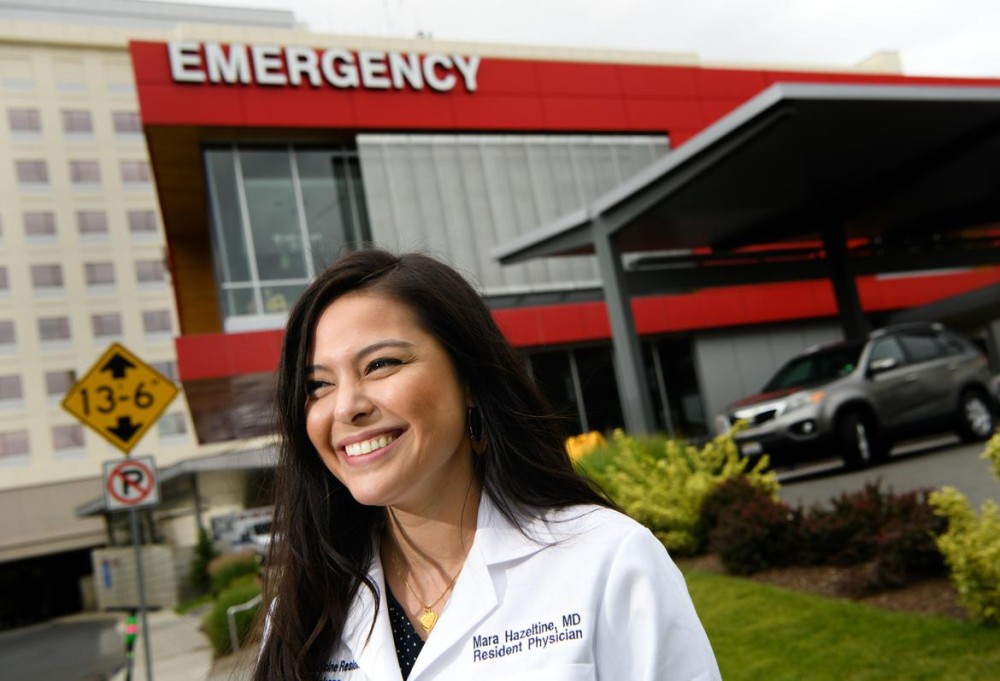Homecoming for health care: UW School of Medicine graduate Mara Hazeltine finds her way back to Sacred Heart for residency
Wednesday, June 26, 2019

(as reported in the Spokesman-Review by Arielle Dreher)
Mara Hazeltine is no stranger to the halls of Providence Sacred Heart Medical Center.
She grew up coming to Sacred Heart with her mother, a nurse for more than 30 years who recently retired.
Now she returns on her own to begin her residency in family medicine after graduating from the University of Washington School of Medicine.
“This place feels like home to me,” she said, noting she still runs into some of her mother’s nursing friends, her “aunties,” in the hallways today.
Hazeltine grew up in the Green Bluff area and graduated from Mt. Spokane High School in 2007. Four years later, she had earned a degree in psychology.
For Hazeltine, the road to becoming a doctor started in the classroom. The daughter of a teacher and a nurse, she decided to teach after graduation through Teach for America. She taught middle school math in Colorado Springs, an experience she believes was one of the most important things she has ever done.
“I think you really start to understand the underpinnings of poverty when you are immersed in that community,” she said. “ … The thing I learned though through that process is that health, really, is a foundation to be able to learn, and so they kind of go hand in hand.”
Hazeltine recalled one of her students who kept his head down on his desk for most of class. She kept coming back to him, trying to figure out what was wrong. When he finally showed her his mouth, full of holes and blackened teeth, she understood: He was in a lot of pain.
“Understanding that family dynamic is huge, like where are they living, what does that house look like, are there environmental exposures going on? Do they have access to food? And how far away is it from the grocery store?” she said. “Are they going to school on a regular basis? Do they have clothes to wear to school? Do they have somewhere to wash them? Those are all things that impact your health in immense ways, so I think family docs tend to have that higher perspective, and they put it into context.”
Her experience in Colorado became the catalyst for her to apply to medical school. She applied to the UW medical school, and when she was accepted, chose to attend classes in Spokane.
This meant that Hazeltine got to come home for medical school, as well as getting experience outside of Spokane County.
She delivered her first baby during her first year of medical school in Tonasket, Washington, during her time in the Rural Underserved Opportunities Program. Hazeltine met the patient earlier that day, and in the middle of the night, she woke up with the doctor she was working and staying with to go deliver the baby.
“I don’t know anywhere else where you can deliver a baby as a first-year student, and you only do that somewhere rural, too,” she said.
While in medical school, Hazeltine served as president of her student medical association, advocating for students’ needs in the midst of a transition to a new curriculum. UW’s medical school in Spokane began its regional health partnership with Gonzaga in 2016. She established a program for students to express concerns and offer suggestions without fear of retribution in closed-to-faculty meetings lovingly dubbed fireside chats. That tradition outlived Hazeltine’s class and it became a best practice, faculty members said.
Hazeltine also started the UW Medical Students for Educational Equity program, a service-learning program that provides medical students at the Spokane campus opportunities to get involved with local schools through tutoring, the walking school bus program or helping with robotics programs and overnight camps. Getting involved with the local community parallels how Hazeltine views her work as a doctor.
“I think getting to know people is the real basis of being a good doctor, getting that narrative is so important, and then you learn things through that that really help you to practice good medicine,” she said.
Hazeltine, now 30, graduated in May in Seattle with other UW medical students, including 34 who were based in Spokane.
All medical school students go through a match process that pairs students with residency programs, usually in the specialty or area of medicine they choose, from pulmonary disease to dermatology to family medicine. Students participate in several two-way interviews during which the residency program and students interview each other to gauge if the arrangement would be a good fit. After interviews, students rank the programs, with their favorites at the top. Residency program directors do the same. Then on a Friday in March, all medical students in the country open their envelopes at the same time.